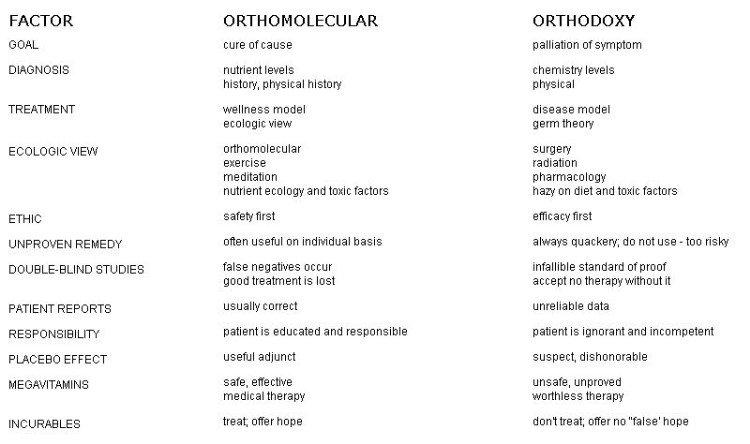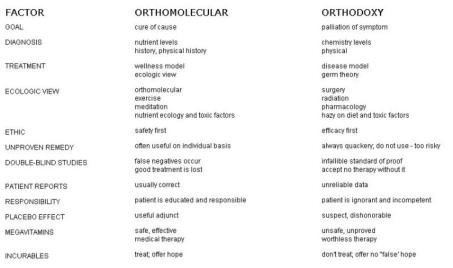


Orthomolecular
medicine
is
a
form
of
complementary
medicine
that
seeks
to
maintain
health
and
prevent
or
treat
diseases
by
correcting
imbalances
or
deficiencies
based
on
individual
biochemistry,
using
substances
natural
to
the
body
such
as
vitamins,
minerals,
amino
acids,
trace
elements
and
fatty
acids.
The
term
“orthomolecular”
was
first
used
by
Linus
Pauling,
Ph.D.,
in
his
ground-
breaking
article
in
Science
in
1968.
The
key
idea
in
orthomolecular
medicine
is
that
genetic
factors
affect
not
only
the
physical
characteristics
of
individuals,
but
also
to
their
biochemical
milieu.There
are
certain
principles
that
identify
Orthomolecular
Medicine
(Dr. Kunin):
1.
Orthomolecules
come
first
in
medical
diagnosis
and
treatment.
Knowledge
of
the
safe
and
effective
use
of
nutrients,
enzymes,
hormones,
antigens,
antibodies
and
other
naturally
occurring
molecules
is
essential
to
assure
a
reasonable
standard
of
care
in
medical practice.
2.
Orthomolecules
have
a
low
risk
of
toxicity.
Pharmacological
drugs
always
carry
a
higher
risk
and
are
therefore
second
choice
if
there is an orthomolecular alternative treatment.
3.
Laboratory
tests
are
not
always
accurate
and
blood
tests
do
not
necessarily
reflect
nutrient
levels
within
specific
organs
or
tissues,
particularly not within the nervous system. Therapeutic trial and dose titration is often the most practical test.
4.
Biochemical
individuality
is
a
central
precept
of
Orthomolecular
Medicine.
Hence,
the
search
for
optimal
nutrient
doses
is
a
practical
issue.
Megadoses,
larger
than
normal
doses
of
nutrients,
are
often
effective
but
this
can
only
be
determined
by
therapeutic
trial. Dose titration is indicated in otherwise unresponsive cases.
5.
The
Recommended
Daily
Allowance
(RDA)
are
intended
for
normal,
healthy
people.
By
definition,
sick
patients
are
not
normal
or
healthy and not likely to be adequately served by the RDA.
6.
Environmental
pollution
of
air,
water
and
food
is
common.
Diagnostic
search
for
toxic
pollutants
is
justified
and
a
high
"index
of
suspicion" is mandatory in every case.
7.
Optimal
health
is
a
lifetime
challenge.
Biochemical
needs
change
and
our
Orthomolecular
prescriptions
need
to
change
based
upon
follow-up,
repeated
testing
and
therapeutic
trials
to
permit
fine-tuning
of
each
prescription
and
to
provide
a
degree
of
health
never before possible.
8.
Nutrient
related
disorders
are
always
treatable
and
deficiencies
are
usually
curable.
To
ignore
their
existence
is
tantamount
to
malpractice.
9.
Don't
let
medical
defeatism
prevent
a
therapeutic
trial.
Hereditary
and
so-called
'locatable
disorders
are
often
responsive
to
Orthomolecular treatment.
10.
When
a
treatment
is
known
to
be
safe
and
possibly
effective,
as
is
the
case
in
much
Orthomolecular
therapy,
a
therapeutic
trial
is
mandated.
11. Patient reports are usually reliable. The patient must listen to his body. The physician must listen to his patient.
12.
To
deny
the
patient
information
and
access
to
Orthomolecular
treatment
is
to
deny
the
patient
informed
consent
for
any
other
treatment.
13.
Inform
the
patient
about
his
condition;
provide
access
to
all
technical
information
and
reports;
respect
the
right
of
freedom
of
choice in medicine.
14.
Inspire
the
patient
to
realize
that
Health
is
not
merely
the
absence
of
disease
but
the
positive
attainment
of
optimal
function
and
well-being.
15.
Hope
is
therapeutic
and
orthomolecular
therapies
always
are
valuable
as
a
source
of
Hope.
This
is
ethical
so
long
as
there
is
no
misrepresentation or deception.The role of Orthomolecular Medicine in relation to medical orthodoxy:
The essential rules are:
Nutrition comes first in medical diagnosis and treatment.
Drug
treatment
is
used
only
for
specific
indications
and
always
with
an
eye
to
the
potential
dangers
and
adverse
effects.
Environmental pollution and food adulteration are an inescapable fact of modern life and are a medical priority.
Biochemical individuality is the norm in medical practice; therefore stereotyped RDA values are unreliable nutrient guides.
Blood tests do not necessarily reflect tissue levels of nutrients.
Nutrient diagnosis is always defensible because nutrient related disorders are usually treatment responsive or curable.
Hope is an indispensable ally of the physician and an absolute right of the patient.
If you would like additional information regarding our services or to request an appointment, you can contact us by phone
(952 80 53 68) or by
email
.









© 2023 - Centro Medicina Natural y Antienvejecimiento - Neural therapy, Homeopathy, Ozone therapy, Carboxytherapy, Mesotherapy
Avda. Juan Carlos I, nº 29, portal 5, 2ºB -- 29680, Estepona (Málaga)



© 2023 - Centro Medicina Natural y Antienvejecimiento
Tel: 952 80 53 68
E-mail: info@medicinabiologica.es
Orthomolecular Medicine
Orthomolecular
medicine
is
a
form
of
complementary
medicine
that
seeks
to
maintain
health
and
prevent
or
treat
diseases
by
correcting
imbalances
or
deficiencies
based
on
individual
biochemistry,
using
substances
natural
to
the
body
such
as
vitamins,
minerals,
amino
acids,
trace
elements
and
fatty
acids.
The
term
“orthomolecular”
was
first
used
by
Linus
Pauling,
Ph.D.,
in
his
ground-breaking
article
in
Science
in
1968.
The
key
idea
in
orthomolecular
medicine
is
that
genetic
factors
affect
not
only
the
physical
characteristics
of
individuals,
but
also
to
their
biochemical
milieu.There
are
certain
principles
that
identify
Orthomolecular
Medicine (Dr. Kunin):
1.
Orthomolecules
come
first
in
medical
diagnosis
and
treatment.
Knowledge
of
the
safe
and
effective
use
of
nutrients,
enzymes,
hormones,
antigens,
antibodies
and
other
naturally
occurring
molecules
is
essential
to
assure
a
reasonable
standard
of
care
in
medical practice.
2.
Orthomolecules
have
a
low
risk
of
toxicity.
Pharmacological
drugs
always
carry
a
higher
risk
and
are
therefore
second
choice
if
there
is
an orthomolecular alternative treatment.
3.
Laboratory
tests
are
not
always
accurate
and
blood
tests
do
not
necessarily
reflect
nutrient
levels
within
specific
organs
or
tissues,
particularly
not
within
the
nervous
system.
Therapeutic
trial
and
dose titration is often the most practical test.
4.
Biochemical
individuality
is
a
central
precept
of
Orthomolecular
Medicine.
Hence,
the
search
for
optimal
nutrient
doses
is
a
practical
issue.
Megadoses,
larger
than
normal
doses
of
nutrients,
are
often
effective
but
this
can
only
be
determined
by
therapeutic
trial.
Dose
titration is indicated in otherwise unresponsive cases.
5.
The
Recommended
Daily
Allowance
(RDA)
are
intended
for
normal,
healthy
people.
By
definition,
sick
patients
are
not
normal
or
healthy
and not likely to be adequately served by the RDA.
6.
Environmental
pollution
of
air,
water
and
food
is
common.
Diagnostic
search
for
toxic
pollutants
is
justified
and
a
high
"index
of
suspicion" is mandatory in every case.
7.
Optimal
health
is
a
lifetime
challenge.
Biochemical
needs
change
and
our
Orthomolecular
prescriptions
need
to
change
based
upon
follow-up,
repeated
testing
and
therapeutic
trials
to
permit
fine-
tuning
of
each
prescription
and
to
provide
a
degree
of
health
never
before possible.
8.
Nutrient
related
disorders
are
always
treatable
and
deficiencies
are
usually
curable.
To
ignore
their
existence
is
tantamount
to
malpractice.
9.
Don't
let
medical
defeatism
prevent
a
therapeutic
trial.
Hereditary
and
so-called
'locatable
disorders
are
often
responsive
to
Orthomolecular treatment.
10.
When
a
treatment
is
known
to
be
safe
and
possibly
effective,
as
is
the
case
in
much
Orthomolecular
therapy,
a
therapeutic
trial
is
mandated.
11.
Patient
reports
are
usually
reliable.
The
patient
must
listen
to
his
body. The physician must listen to his patient.
12.
To
deny
the
patient
information
and
access
to
Orthomolecular
treatment
is
to
deny
the
patient
informed
consent
for
any
other
treatment.
13.
Inform
the
patient
about
his
condition;
provide
access
to
all
technical
information
and
reports;
respect
the
right
of
freedom
of
choice in medicine.
14.
Inspire
the
patient
to
realize
that
Health
is
not
merely
the
absence
of
disease
but
the
positive
attainment
of
optimal
function
and well-being.
15.
Hope
is
therapeutic
and
orthomolecular
therapies
always
are
valuable
as
a
source
of
Hope.
This
is
ethical
so
long
as
there
is
no
misrepresentation
or
deception.The
role
of
Orthomolecular
Medicine
in relation to medical orthodoxy:
The essential rules are:
Nutrition comes first in medical diagnosis and treatment.
Drug
treatment
is
used
only
for
specific
indications
and
always
with an eye to the potential dangers and adverse
effects.
Environmental
pollution
and
food
adulteration
are
an
inescapable fact of modern life and are a medical priority.
Biochemical
individuality
is
the
norm
in
medical
practice;
therefore stereotyped RDA values are unreliable nutrient guides.
Blood tests do not necessarily reflect tissue levels of nutrients,
Nutrient
diagnosis
is
always
defensible
because
nutrient
related disorders are usually treatment responsive or curable,
Hope
is
an
indispensable
ally
of
the
physician
and
an
absolute
right of the patient.
If
you
would
like
additional
information
regarding
our
services
or to request an appointment, you can contact us by phone
(952 80 53 68) or by
email
.

























